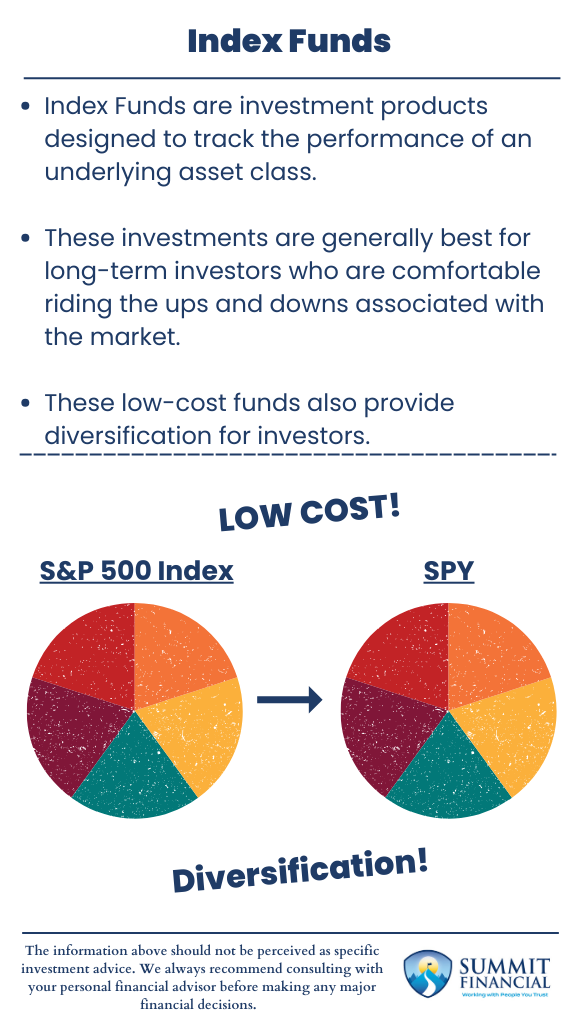The stock market performance in the past has led many to believe Index Funds are the best investment option. Index Funds are investment products designed to track the performance of an underlying asset class.
For example, an S&P 500 index fund would provide returns equivalent to the S&P 500 index. Typically, investors will allocate to a Total Stock Market or a Total Bond Market index fund in order to receive the return of the overall market.

Who Should Consider Investing in Index Funds?
These investments are generally best for long-term investors who are comfortable riding the ups and downs associated with the market.
The market has recovered from every correction and dip throughout history, so some investors just prefer to buy and hold for as long as possible. These investors believe it is impossible to time the market and outperform the index, so they simply buy the index.
These index funds are not actively managed, so the analysts will not be selling in order to avoid market downturns, which may not be suitable for investors who cannot stomach the wild market swings.
Diversification and Cost Benefits of Index Funds
Index funds also offer great diversification for investors who want to keep things simple. By buying one fund, you can receive exposure to many market sectors such as technology, healthcare, financials, energy, etc.
You can receive this broad exposure even if you only invest in a single. For those who manage their own long-term investments, this is an easy way to spread risk.
Also, since Index Funds are simply allocated to the underlying index, there are very few costs associated with managing the fund. These lower costs benefit the investor since most index funds have extremely low expense ratios. You can find some funds with expenses as low as .03%.
Potential Disadvantages of Index Investing
We believe there is a time and place where index funds are appropriate. We use them at times with our in-house portfolios, but only for a portion of the accounts.
Index Funds are great for broad market exposure, but we do not always agree with the concept of only using a few buy-and-hold funds.
Our goal is to actively manage our accounts to potentially avoid the market downturns while participating in the upside. As always, we recommend meeting with your personal financial advisor before making any major decisions.
Role of Index Funds in an Investment Portfolio
- Index Funds are investment products designed to track the performance of an underlying asset class.
- These investments are generally best for long-term investors who are comfortable riding the ups and downs associated with the market.
- These low-cost funds also provide diversification for investors.
Speak With a Trusted Advisor
If you have questions about Index Funds, taxes, your individual investment portfolio, retirement planning, our 401(k)-recommendation service, or anything else in general, please call our office at (586) 226-2100.
Please feel free to forward this commentary to a friend, family member, or co-worker. If you have had any changes to your income, job, family, health insurance, risk tolerance, or overall financial situation, please give us a call so we can discuss it.
We hope you learned something today. If you have any feedback or suggestions, we would love to hear them.
Best Regards,
Zachary A. Bachner, CFP®
with contributions from Robert Wink, Kenneth Wink, James Wink and James Baldwin
If you found this article helpful, consider reading:
- Navigating College Funding
- Financial Planning Mistakes to Avoid
- Debt Repayment Strategies
- How to Negotiate a Raise
Sources:


